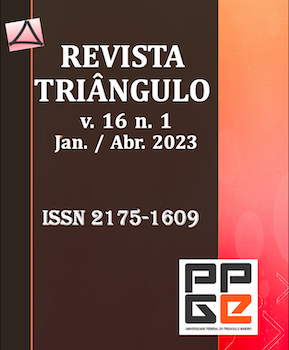COMMUNICATION AND HISTORICAL NARRATIVE IN PROFESSIONAL EDUCATION
EDUCATION AS A SYSTEM OF POWER
DOI:
https://doi.org/10.18554/rt.v16i1.6156Keywords:
Communication, Professional Education, Historical Narrative, Curriculum, EducationAbstract
The present work seeks to reflect on the role of communication and historical narratives, in the context of education as a system of power. This relationship makes possible the analysis course on different items that constitute our objective. Thus, we aim to understand the degree of influence of the choices of educational guidelines in the teaching and learning process, based on the contents chosen to be part of the students' knowledge framework. Thus, we divided our analysis into four parts, in which each item leads to an understanding of the educational scenario, which is represented in the form of communication of these elements as narratives. The first part seeks to deal with the history of education with the bias of communication and the intentionality of the educational process, through the duality of teaching and training of manpower, maintaining the traditional social structure. The second part deals with historical narrative as research and historiographical production. In the third part, we reflect on the educational system and the power relationship, constitutive of the production of knowledge. In the fourth part, we deal with the intentionality of the school curriculum, as an advent of maintenance of the current order and capitalist interference in its production.
References
A EDUCAÇÃO proibida. Direção de German Doin e Verônica Guzzo. Associación Civil Redes de Pares/reevo, 2012. (146 min.), disponível no You Tube: A Educação Proibida - Filme completo em HD (áudio Português) - YouTube. (acessado dia 17/08/2021).
CHARTIER, Roger. Defesa e ilustração da noção de representação. Fronteiras, v. 13, n.24, p. 15-29, 2011. Disponível em: http://ojs.ufgd.edu.br/index.php/FRONTEIRAS/article/download/1598/955. Acessado em 20 de Novembro de 2021.
CHARTIER, Roger. O passado no presente. História Revista, v. 26, n. 2, p. 29-53, 2021. Disponível em: http://cpdoc.fgv.br/producao_intelectual/arq/517.pdf. Acessado em 20 de Novembro de 2021.
DELEUZE, Gilles. Post-Scriptum sobre as Sociedades de Controle, in L'Autre Journal, n° 1, maio de 1990.Texto extraído de Conversações, 1ª Edição, 3ª Reimpressão, Editora 34, Rio de Janeiro, 2000 Tradução: Peter Pál Pelbart.
DE OLIVEIRA MOREIRA, Henrique. Resenha do livro “conscientização” de Paulo Freire. Revista Científica Multidisciplinar O Saber-ISSN 2675-9128, v. 1, n. 11, 2021. Disponível em: 202-Material para submissão-656-1-10-20211201.pdf. acessado em 5 de Dezembro de 2021.
FOUCAULT, Michel. Vigiar e punir. Leya, 2014. Disponível em: Foucault_Vigiar_e_punir_I_e_II-with-cover-page-v2.pdf (d1wqtxts1xzle7.cloudfront.net). acessado em 14 de Novembro de 2021.
FREIRE, Paulo. Paulo. Pedagogia do oprimido, v. 43, 1996.
HUNT, Lynn Avery. Modelos de história cultural. In:______. A nova história cultural. São Paulo: Martins Fontes, 1992. Disponível Repositório de Informação Acessível: Modelos de história cultural (ufrn.br).
KRAMER, Lloyd S. Literatura, crítica e imaginação histórica: o desafio literário de Hayden White e Dominick LaCapra. HUNT, Lynn. A nova história cultural. São Paulo: Martins Fontes, 1992.
LAVE, Jean; WENGER, Etienne. Aprendizaje situado: participación periférica legítima. UNAM, Facultad de Estudios Superiores Iztacala, 2003.
LUCKESI, Cipriano Carlos. Avaliação da aprendizagem escolar: estudos e proposições. Cortez editora, 2014.
MOMIGLIANO, Arnaldo. As raízes clássicas da historiografia moderna. Edusc, 2004. Disponível em: arnaldo-momigliano-as-raizes-classicas-da-historiografia-moderna.pdf (usp.br). Acessado em 21 de Novembro de 2021.
SAVIANI, Dermeval. A pedagogia histórico-crítica, as lutas de classe e a educação escolar. Germinal: Marxismo e educação em debate, v. 5, n. 2, p. 25-46, 2013. Disponível em: https://periodicos.ufba.br/index.php/revistagerminal/article/viewFile/9697/7085. Acessado em 18 de Novembro de 2021.
SAVIANI, Dermeval. Escola e democracia. Autores associados, 2018. Disponível em: http://200.17.101.9/wiki/images/2/20/Saviani_-_Cap1.pdf. Acessado em 18 de Novembro de 2021.
SILVA, Maria Aparecida da. História do currículo e currículo como construção histórico-cultural. 2010. 2010.
SOUZA, Ryhã Henrique Caetano e. BRETTAS, Anderson Claytom Ferreira. Literatura no Ensino de História: ‘Terra Sonâmbula’ de Mia Couto e a Guerra Civil Moçambicana (1977/1992). In: Org.: Margareth Torres de A. Costa ... [et al.]. LITERATURA, MEMÓRIA E CULTURA - Aproximações teórico –críticas. Terezina: IFPI. 2021.
PERRENOUD, Philippe. A formação dos professores no século XXI. PERRENOUD, Philippe; THURLER, Monica Gather, et al. As competências para ensinar no século XXI: a formação dos professores e o desafio da avaliação. Porto Alegre: Artmed. 2002a. cap, v. 1, p. 11-33, 2002.
PETERS, Michael. Pós-estruturalismo e filosofia da diferença. Uma introdução. Trad. Tomaz Tadeu da Silva. Belo Horizonte, 2000.
WACHOWICZ, Lílian Anna; ROMANOWSKI, Joana Paulin. Avaliação: que realidade é essa?. Avaliação: Revista da Avaliação da Educação Superior, v. 7, n. 2, 2002.
WHITE, Hayden. O texto histórico como artefato literário [1974]. In: _____. Tópicos do discurso: ensaios sobre a crítica da cultura. Tradução Alíio C. de Franca. São Paulo: EDUSP, 2001, p. 97-116.
Downloads
Published
How to Cite
Issue
Section
License
Copyright (c) 2023 JOURNAL TRIANGLE

This work is licensed under a Creative Commons Attribution-NoDerivatives 4.0 International License.
Autores que publicam nesta revista concordam com os seguintes termos: Autores mantém os direitos autorais e concedem à revista o direito de primeira publicação, com o trabalho simultaneamente licenciado sob a Licença Creative Commons Attribution que permite o compartilhamento do trabalho com reconhecimento da autoria e publicação inicial nesta revista.




